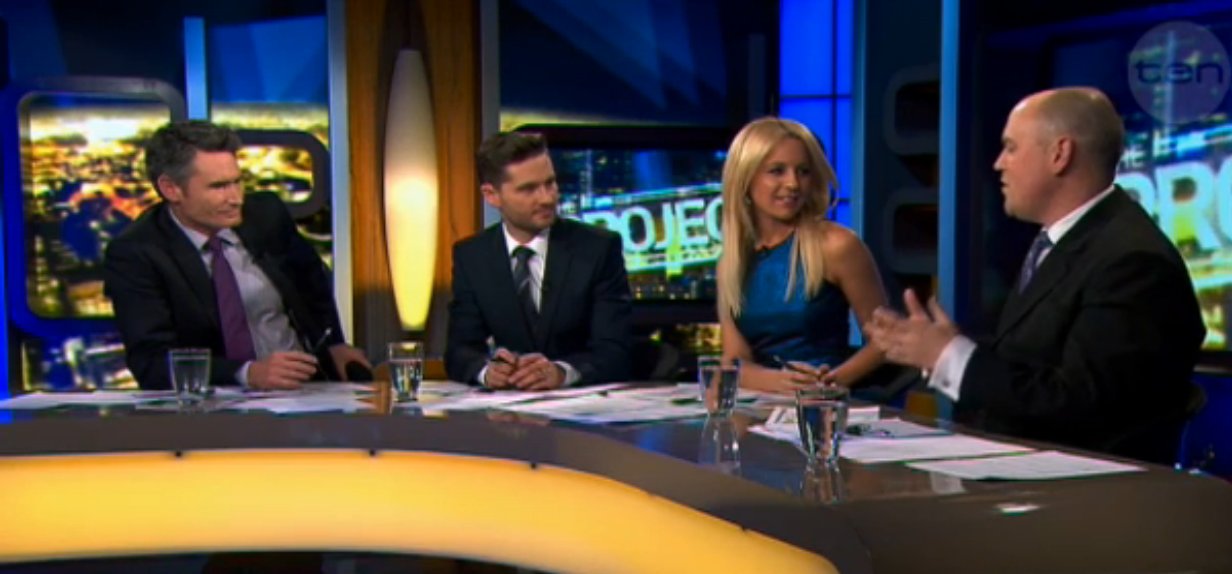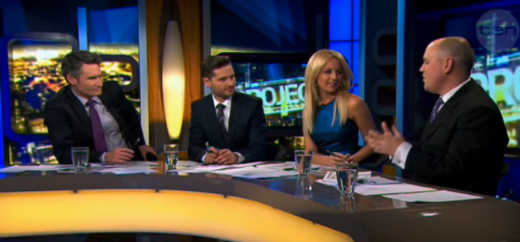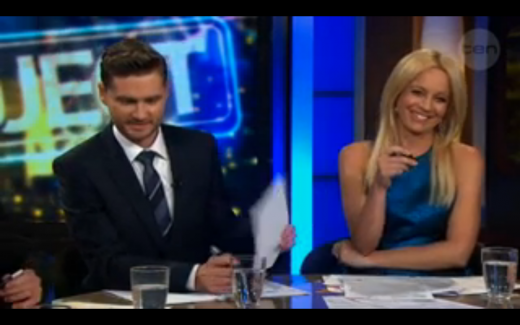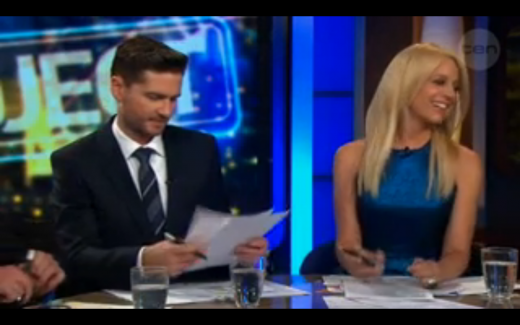
Big Brother with brains? SBS has something of a winning formula when it comes to mashing up people whose view points are diametrically opposed, and standing back to watch nature take its course. Go Back To Where You Came From was TV crack cocaine. I don’t know if these shows are all that great at producing lasting change, but watching people squirm through the reality of messy human relationships made up of messy humans with conflicting views is pretty good arm chair fodder. It’s voyeurism with a conscience..
Tonight Living With The Enemy, SBS’s new fly on the wall doco series, pitted Anglican Minister and blogger David Ould against engaged (and spoiler, by the end of the show, married) gay couple Gregory Storer and Michael Barnett. You can read a longish interview I did with David Ould back when he was getting over his first 15 minutes of fame on The Project.
David mentioned this show back in that interview – so I’d been looking forward to seeing it. I was expecting a crucifixion; a public humiliation where David managed to die a humiliating, public, death for the sake of the Gospel. We got some good Gospel stuff – but had to sit through the producer’s commitment to David undergoing some sort of redemptive narrative arc in order to get there. In something of an explanation not just of why he’s holding his position, but why he’s prepared to do it on national TV, David at one point says:
“I’m gonna stick with what Jesus says even if it makes me unpopular”
Like Go Back To Where You Came From the show is geared to emphasise just how opposed two particular views are. Unlike Go Back To Where You Came From the agenda in Living With The Enemy did seem to be to paint both positions (at least in this debate) with a degree of sympathy. It certainly wasn’t clear that David was the bad guy. He was charming while his interlocutors were strident. He appeared committed to having a conversation while Michael Barnett used a pow wow in a sandstone, stained-glass windowed church to launch a stinging string of coarse invective at both David and the God he represents.
When Michael and Gregory arrived at David’s house they were told they wouldn’t be living in the house, but in a specially produced caravan. I don’t know how I would have handled this. I honestly don’t. But it did set a particular tone for the show where David was ‘exclusive’ while the gay couple were ‘inclusive’ – inviting David along to their wedding, and to join them in a gay pride march. This was a shame. I’m loathe to criticise the approach David took. Parenting is a fraught ethical mine field, but I would have loved to have seen an all or nothing approach to having the guys live with a Christian family. It’s just that the decision involves real people – so while it would’ve been an interesting social experiment for me, the voyeuristic viewer, I (and the other remote jockeys around the country who feel this way) shouldn’t be in the driving seat when it comes to David’s family.
I love David, Michael, and Gregory’s willingness to take part in this exercise – but I felt like Michael, in particular, was more interested in scoring rhetorical points than in furthering the conversation. This could well have been a result of the producer’s desire for conflict. Both Michael and Gregory were genuinely upset and outraged by the Christian position – and this is one of the reasons we need to be exceptionally clear when we speak into this issue. We’re talking about real people with real emotions and real relationships. It’s messy. But all life is.
I thought the stuff with David’s identical twin brother Peter was particularly interesting. Having read Peter’s (now archived) blog for a few years I enjoyed his cameo. His story is significant, especially in the light of all the twin studies out there that have tried to explain the origins of sexual orientation. He makes an argument, by example, for the idea that sexual orientation can be somewhat fluid for some people. The format wasn’t a great format for presenting a nuanced view of this area – but I would have loved to see something in there about faithful singleness rather than a miraculous conversion to heterosexuality (even though Peter acknowledged this hasn’t been the entirety of his experience).
As much as I like David, as much as I enjoy his writing, his media appearances, and have enjoyed a few conversations with him over the last few years, I’m not in complete lock step with him when it comes to the marriage debate. I don’t particularly like his occasional reference to linking the production of children to marriage. I’m keen on defining it as a picture, affirmed and created by God, of the relationship between Jesus and the church. And seeing where we get to from there. The children bit kind of rules out (or devalues) marriage for people who know they can’t have kids or for people beyond child bearing age.
I’m also not particularly interested in fighting to convince an increasingly secular (and historically secular) nation that Christian definitions or constructs should bind them. The scene in the church, while jarring and offensive, actually cogently presented the atheist/homosexual case. And in a democracy, that case has legs. It’s just a case that needs to be made giving equal air time to all the views of all the constituents. Gregory is also right to want to avoid majorities dictating things for minorities. Might doesn’t make right. But this cuts both ways – whatever happens in the wash up of the marriage debate should protect all minorities, including people who want to maintain the Bible’s definition of marriage. That hasn’t necessarily been the case in other countries where the definition of marriage has shifted. Gregory and Michael need Jesus in order for the Christian view of sexuality to make sense. That’s the gap between Gregory and Michael and David’s twin brother Peter. The Gospel is compelling. Jesus is better than sex. His definition of love is better than anything we can imagine or experience. It is, as David calls it, profound. And appreciating this profundity is the key to reordering our understanding of sexual morality, and our definition of marriage flows from that. The Gospel is the horse that drives the marriage cart and how we define it.
Producing a redemption narrative and THAT sermon
I don’t think David was naive when it came to what he was signing up for, and how it might be presented, but the perennial issue facing Christians who do any sort of media stuff is that while we have an agenda that pushes us to get in front of the camera – proclaiming Jesus – the person wielding the camera has a different agenda: putting together a product that captures attention and entertains. This is even more true in a series like this.
The producer of this program had a vested interest in presenting conflict between the ‘enemies’ and also in presenting a compelling picture of people being changed by the experience.
The church service featured in the show was a dummy service produced for the show. David didn’t just happen to preach about homosexuality as a deliberately pointed attack on his guests. That wouldn’t be particularly hospitable. I know this to be true, but you can also work it out because he says “this afternoon we will be talking about…” and Glenquarie Anglican only has a morning service. But this service was used as part of the narrative of redemption, the story arc that David’s character is taken on as he is confronted and changed by the utter humanity of his conversation partners (which is where the show ends up). It was edited so that David’s sermon boils down to Leviticus. And the idea that homosexuality is detestable. The complete recording of the sermon is available (as of tonight) on Glenquarie Anglican’s website. The producer takes the sermon massively out of context. He makes it something it isn’t (but, to be fair, he does zero in on how the sermon was heard by Gregory and Michael).
The old rule applies.
Never say something in front of a camera you don’t want taken out of context and broadcast to the world.
If you want the Gospel stuff to be included in the show – only say the Gospel stuff. Don’t talk about Leviticus. David’s position in the show gets closer to being Gospel driven as the ‘journey’ comes to an end; it’s not that David has changed, it’s that the presentation of his character shifts.
I’m sympathetic to the need for Christians to be able to articulate a position on Leviticus because it’s part of the Bible and this is a massive belief blocker for modern Australians. But the harsh edit of that sermon should have been expected, and maybe this wasn’t the platform to try to present a nuanced position that incorporates the whole counsel of God. I don’t know.
David’s ‘character’ undergoes a massive upwards turn, as far as the show presents him, at the point when he is invited to attend Michael and Gregory’s wedding. His response is beautiful. He thanks them for extending this inclusive attitude to him. He is polite and good-humoured throughout the wedding proceedings even though he is as out of his comfort zone, as any stranger attending a wedding of people who have spent five days being hostile, and who is invited for the sake of a television spectacle might be. Which is to say he’s not all that comfortable. But he has a couple of nice conversations with the mother of the groom, and the father of the groom.
David’s comment that using marriage to validate a relationship makes the relationship necessarily more self-serving than other weddings, was interesting, and worth considering.
After the wedding he has an interesting altercation with Michael, who asks, “what would Jesus do?” His answer is nice.
“Jesus goes to many, many, people who he disagrees with. And he loves them profoundly. And he calls them to change.”
This ‘going to’ people in order to profoundly love them becomes the core of the redemption of David’s character at the hands of the producer in the downhill run to the program’s finish line. David is invited to take part in a gay pride parade. He agrees to in order to fully understand the reality of life for Michael and Gregory. The lack of ‘going to’ – the costly moving to where people are at – was a big feature of the producer’s use of the caravan and the awkward sermon – and that changes, in the show, because David is so well ‘included’ when he gets to Michael and Gregory’s house. The house of “no rules.”
It’s interesting that the show seems to play with this exclusion/inclusion dynamic, while not really editorialising the weird crassness/winsomeness divide. David, throughout, seems genuinely keen to be warm, even when he knows the caravan decision isn’t going to be popular. And this warmth continues when they aren’t face to face, using the diary camera. Michael and Gregory, on the other hand, are massively scathing of David (and his position) when he isn’t there, and, consistently, incredibly abrasive when he is.
In David’s pre-pride march epiphany he says he wants to love like Jesus does. Profoundly. Loving and being the friend of sinners and drunkards. This pushes him out of his comfort zone. And onto the streets of Melbourne with potentially, as Gregory named his fear: “a bunch of near naked men doing disgusting things with each other.” As he walks, David says “I’m not affirming their relationship, I’m just trying to be their friend”… It’s possible to be friends despite disagreeing. “People are being gracious, being kind to me,” says David – he is genuinely being included by the gay community. Something for us to learn as Christians (though Gregory and Michael were pretty comfortable in David’s church, except when he was preaching).
The concluding statements where everybody has come through the experience changed (but unchanged) David says something really nice.
David: “I think the word enemy is not a good word for this discussion that we’re having. We’re conversation partners. We’re going to disagree. And if we work harder to find out what we can agree on and at least understand each other better, we can not only have a good conversation ourselves but actually maybe help our friends to have good conversations as well.”
“It has helped me further understand what life is like for gay people. Particularly what drives them on this issue. I haven’t changed my mind, but I’ve understood them better, I think.”
Gregory: “I have gained a bit of an insight into how the mind of somebody who is against marriage equality, how their mind actually works. I’ve learned that you can have good conversations with people if you take your time and listen carefully. You can understand somebody else’s point of view without agreeing with them
David: “I’m not sure I’m more sympathetic to the arguments Michael and Gregory gave me. I think I am more empathetic. I think I understand them more. I feel them more. What I’m going to do most of all is walk away from this experience and talk to my peers, my friends, those who are on my side of this debate and say here’s a couple of things I think you need to get clearer in your head.”
It was an interesting experiment. I’m looking forward to hearing his reflections in coming days.



